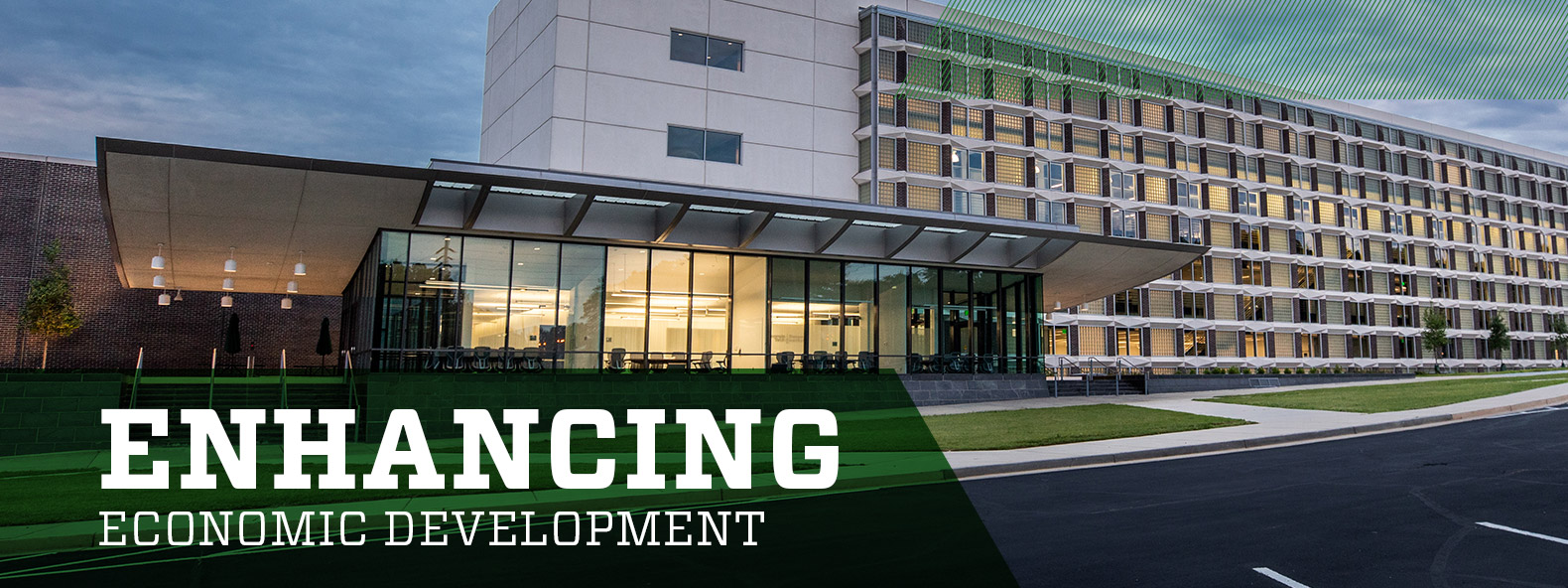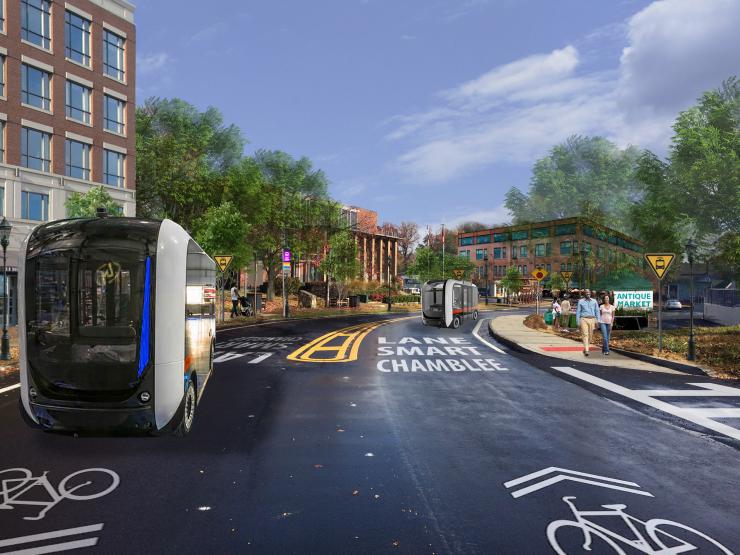
Annual Report 2019: Enhancing Economic Development
Key to Georgia Tech’s overall success as an institution is our success in helping boost the economies of the communities we serve in and around Georgia. By tapping into and engaging local businesses and communities, we have been maximizing our collective strengths and meaningfully fostering economic development.
GTRI Celebrates Opening of Cobb County Research Facility South Campus
GTRI Celebrates Opening of Cobb County Research Facility South Campus
The Georgia Tech Research Institute (GTRI) celebrated the grand opening of its Cobb County Research Facility (CCRF) in spring with a ribbon-cutting ceremony.
Located on Lockheed Martin’s Marietta campus and adjacent to Dobbins Air Reserve Base, the south campus, named CCRF-South, now houses four newly renovated buildings — plus 20 acres of undeveloped land — that have been developed into large testing and research spaces as well as renovated offices.
The estimated $42 million expansion has allowed GTRI to fit its growing portfolio and staffing needs, doubling its original footprint established in 1978.
CCRF-South is home to four of eight GTRI laboratories: the Aerospace, Transportation, and Advanced Systems Laboratory (ATAS); the Cybersecurity, Information Protection, and Hardware Evaluation Research Laboratory (CIPHER); the Electronic Systems Laboratory (ELSYS); and the Sensors and Electromagnetic Applications Laboratory (SEAL). Laboratories on the campus will continue to research solutions and engineer technologies that support national security, economic development, health analytics, and food processing.
For more than 40 years, GTRI and Lockheed Martin have collaborated on groundbreaking projects. The expansion of GTRI’s campus facilitates an even closer relationship between the two organizations. GTRI, in partnership with Lockheed Martin, is building a community that will not only change the economic landscape of south Cobb County but also continue to strengthen GTRI’s impact on the nation’s technological advances.
Smart Communities Address Housing, Transportation, Flooding Issues

Georgia Tech’s Christopher Le Dantec presents at the Georgia Smart Communities Challenge meeting in Chamblee. Below: An artist’s rendering of an autonomous vehicle.

Smart Communities Address Housing, Transportation, Flooding Issues
As part of the Georgia Tech-led Georgia Smart Communities Challenge begun in September 2018, four Georgia communities collaborated with local partners and Georgia Tech research teams on year-long projects to help drive the state’s smart development.
“We define ‘smart development’ as the integration and application of technologies to improve the quality of life,” said Debra Lam, managing director of Smart Cities and Inclusive Innovation at Georgia Tech. “There is a misconception that smart community innovations always must start in a major city and trickle down to smaller places, but innovations can trickle up as well. They can be developed more quickly in smaller communities because you have all stakeholders in the room: the mayor and city manager, public agencies, community and neighborhood groups, industry and business.” Each community received $50,000 in grants and $25,000 from Georgia Tech in research support. The communities also raised matching funds.
“A next step will be to spread what’s learned from these smart development projects to other Georgia communities and beyond,” said Lam.
The four localities chosen for 2018 were:
- Albany, a city in the southwest corner of the state, drew on Smart Communities support to develop and evaluate an automated housing registry that could help answer the question: Why do public investments in housing and infrastructure fail to revitalize some blighted neighborhoods?
- Chamblee used its funding to study how improving urban design and passenger experiences can help build ridership for the shared autonomous vehicle.
- Chatham County in coastal Georgia used its Smart Communities support to develop a sensor network partnered with data analytics for more accurate localized flooding forecasts for improved emergency planning and response.
- Gwinnett County chose to engage multiple stakeholders across the state to set the standard for application of connected vehicle technology. This will improve mobility and traffic safety by working toward implementing a master plan for autonomous real-time data sharing among connected vehicle applications, signals, and other roadway sensors.
On June 18, the 2019 winning proposals were named: Columbus Smart Uptown, Macon Smart Neighborhoods, Milton Smarter Safer Routes to School, and Woodstock Smart Master Plan and Corridor Study.
Georgia Power is the lead sponsor of the Georgia Smart Communities Challenge, and additional financial support is provided by the Atlanta Regional Commission.
$4.3 Million Secured to Advance Tech Square Phase III
$4.3 Million Secured to Advance Tech Square Phase III
The University System of Georgia’s FY 2020 budget included $4.3 million in planning and design funds for Phase III of Technology Square.

Tech Square Phase III will be located on the northwest corner of West Peachtree and Fifth Streets. Initial programming envisions a two-tower complex, which will likely contain graduate and executive education for the Scheller College of Business and the Stewart School of Industrial and Systems Engineering, and other programming. The project may also include a large plaza with street-level retail and an underground parking deck.
At an estimated cost of about $200 million, Phase III would provide more than 400,000 gross square feet. The earliest the building could open would be 2022.
The overarching purpose behind Tech Square, which was established in 2003, is to foster solid connections and collaboration between the Institute and the business community. Today, the area is recognized as a thriving innovation ecosystem thanks to a robust network of students, faculty, researchers, startup entrepreneurs, and global corporations. Dover’s Mindsparq and Georgia-Pacific’s PointA are the latest corporate innovation centers to take up residence in Tech Square.
Ports Authority, Tech, and Center of Innovation for Logistics Sign Memorandum of Understanding
Ports Authority, Tech, and Center of Innovation for Logistics Sign Memorandum of Understanding

Then-Georgia Tech President G.P. “Bud” Peterson shares some remarks during the MOU signing event at the Port of Savannah on July 31, 2018.
Through a 2018 Memorandum of Understanding (MOU), Georgia Ports Authority (GPA), Georgia Tech, and the Georgia Center of Innovation for Logistics have created a new relationship aimed at supporting the state’s logistics industry in economic development, research, and education.
The goal of the MOU is to bring advanced research, evolving global logistics trends, and analysis from the world to Savannah. By tapping into the hands-on expertise at GPA and the Georgia Center of Innovation for Logistics — as well as the high-tech analysis and research at Georgia Tech’s Supply Chain and Logistics Institute — cargo owners and third-party logistics providers will gain insight into everything from when and where to build infrastructure to improved efficiency in cargo routing.
Matt Markham, director of the Georgia Center of Innovation for Logistics, said the collaborative effort further strengthens the state’s position as an economic development leader.
“Most companies that choose Georgia as their home depend on its world-class logistics for their success,” Markham said. “Our new relationship builds on our center’s goal of providing company-specific analyses and facilitating connections between logistics providers and potential clients.”
The multi-modal network is designed to combine ocean, truck, rail, and air transportation to create optimal conditions for an easier and faster network.
New Energy Management Improvement Program Helps Manufacturers Improve Competitiveness
New Energy Management Improvement Program Helps Manufacturers Improve Competitiveness
The Georgia Manufacturing Extension Partnership (GaMEP), an economic development program of Georgia Tech’s Enterprise Innovation Institute, has launched a new program to help manufacturers boost their competitiveness by implementing ISO 50001 energy management best practices.
The Southeast MEP Energy Management Program is being funded with a grant from the U.S. Department of Commerce’s National Institute of Standards and Technology Manufacturing Extension Partnership (MEP).
“[It] aims to help companies in the Southeast accelerate their energy and cost savings, and reduce greenhouse gas emissions by incorporating best practices as outlined by ISO 50001,” said Bill Meffert, GaMEP’s group manager for energy and sustainability projects.
The ISO 50001 Energy Management System, an international standard that GaMEP had a role in developing, provides business and industry with an energy performance improvement framework.
Participants in the Southeast MEP Energy Management Program will take a series of classes and webinar sessions, and receive onsite coaching over a 12-month period. Completing the program allows them to be certified by the U.S. Department of Energy as 50001 Ready by showing they’ve implemented the standard into their operations.
“This energy management system is applicable to a whole host of industries from textiles and floor coverings, to food and beverage, to automotive manufacturing,” Meffert said. “Incorporating these standards and changing processes for energy usage can really make a difference to the bottom line, while also helping companies meet their competitiveness and sustainability objectives.”
A medium- to large-sized company with 250 employees or more could spend more than $1 million a year on energy, including electricity, natural gas, fuel, and water.
Since the ISO standard’s adoption in 2011, the GaMEP has helped more than 70 facilities in North America to implement ISO 50001. With offices in 10 regions across the state, the GaMEP has been serving Georgia manufacturers since 1960.


Amanda Foster (left), a research scientist in the Georgia Tech Research Institute, collaborates with research associate Megan Denham at Coda.
Coda Opens for Collaboration
On May 23, Georgia Tech and Portman Holdings officially opened Coda, the flagship building for the Institute’s Technology Square — an area dubbed “the Southeast’s premier innovation neighborhood.”
Developed by Portman Holdings and Databank, the 755,000-square-foot structure is believed to be the largest of its kind: a facility built to actively encourage the kind of collaboration between university researchers — including students — and industry that can lead to new technologies. Georgia Tech is the anchor tenant, occupying about 50% of the available space. The rest will be leased to companies such as ThyssenKrupp, Keysight Technologies, and WeWork, which will be home to several startup companies. Coda is also directly responsible for attracting Anthem Technology to the area. The company aims to move some 1,000 employees to Tech Square.
In 2016, Invest Atlanta, the City of Atlanta’s development authority, estimated that Coda could have an economic impact of $813.8 million over the next two decades.
“Collaboration among different disciplines, and between academia and industry, will be critical to developing solutions to the complex societal challenges facing us in the years ahead,” said Chaouki Abdallah, Georgia Tech’s executive vice president for Research. “Coda is intended to facilitate that through a unique design including a collaborative core with a spiral staircase that creates opportunities for unanticipated collisions and constructive interactions among those working in the building.”
Coda will also be Tech’s headquarters for research involving data analytics. Because data analytics requires significant expertise in computing, Tech has relocated its Office of Information Technology to Coda. In addition, Coda will feature a data center that will be home to much of the high-performance computing architectures Georgia Tech uses in its analytics research. Access to the data center is expected to draw additional collaborations from within Atlanta and around the country.
Coda is now home to Georgia Tech “research neighborhoods.” These include three of the university’s Interdisciplinary Research Institutes (IRIs), which bring together researchers from across campus to address topics too broad to be covered by a single school or program. The IRIs in Coda are the Institute for Data Engineering and Science, the Institute for Information Security and Privacy, and the Institute for People and Technology. The research neighborhoods are spread over 11 floors of the 21-story building. To encourage collaboration between Tech researchers and industry, “We purposefully left room on many floors for like-minded companies to rent space near a given neighborhood,” said Tony Zivalich, executive director of Georgia Tech’s Office of Real Estate Development.
(text and background only visible when logged in)
